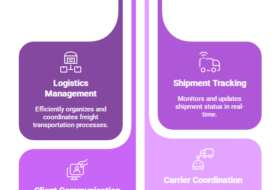Freight Broker Exam
Becoming a licensed freight broker is a significant milestone in the logistics industry. It not only opens the door to a rewarding career but also signifies your expertise in facilitating the movement of goods. To achieve this, passing the freight broker exam is crucial. The exam, designed to assess your knowledge of regulations, negotiation skills, and industry practices, requires thorough preparation. In this comprehensive guide, we will navigate the intricacies of freight broker exam preparation, providing you with essential tips and resources to ensure your success.
- Understanding the Freight Broker Exam
The freight broker exam assesses your knowledge of federal regulations, contract negotiation, licensing requirements, and ethical practices within the freight brokerage industry. It is a comprehensive test that challenges your understanding of the complexities of logistics and transportation. - Importance of Proper Exam Preparation
Proper preparation is the key to passing the freight broker exam. A well-prepared candidate not only increases their chances of success but also gains confidence in applying their knowledge effectively in real-world scenarios. - Choosing the Right Study Materials
Selecting the appropriate study materials is crucial. Invest in reputable study guides, textbooks, and online resources specifically designed for freight broker exam preparation. Ensure the materials are up-to-date and cover all relevant topics outlined in the exam syllabus. - Creating a Structured Study Plan
Develop a structured study plan that covers all the exam topics systematically. Allocate specific time slots for each subject, ensuring comprehensive coverage. Break down the study material into manageable chunks, making it easier to absorb and retain information. - Focus Areas: Regulations, Contracts, and More
Focus on key areas such as federal regulations (FMCSA regulations, transportation laws), contract negotiation and drafting, insurance requirements, and ethical business practices. Understanding the legal and regulatory aspects is essential for the exam. - Utilizing Practice Exams and Mock Tests
Practice exams and mock tests are invaluable resources. They simulate the exam environment, allowing you to gauge your knowledge, identify weak areas, and familiarize yourself with the question format. Regularly assess your progress using these practice tests. - Effective Study Techniques
Employ effective study techniques, such as summarizing complex topics in your own words, creating flashcards for quick review, and teaching the material to someone else. These techniques enhance retention and understanding. - Engaging in Peer Study Groups
Joining study groups with peers preparing for the same exam can provide fresh perspectives and enhance your learning experience. Discussing topics, sharing insights, and clarifying doubts with peers can reinforce your understanding of complex subjects. - Overcoming Exam Anxiety
Manage exam anxiety by practicing relaxation techniques, getting adequate rest before the exam day, and maintaining a positive mindset. Trust in your preparation and believe in your abilities to tackle the exam successfully. - Conclusion:
In conclusion, excelling in your freight broker exam requires dedication, focus, and a well-structured approach to preparation. By understanding the exam content, utilizing effective study materials, engaging in practical exercises, and managing exam anxiety, you can increase your chances of success. Remember, thorough preparation not only helps you pass the exam but also equips you with the knowledge and confidence to excel in your future career as a licensed freight broker. So, embark on your exam preparation journey with determination and commitment, and soon you’ll be well on your way to achieving your goal of becoming a certified freight broker.
Growth + Change = Opportunity! How are you going to capitalize on the opportunity as a freight broker, agent, dispatcher or box truck carrier?
Enroll in a course today and get a Shippers List for free! Use Code: freeship







